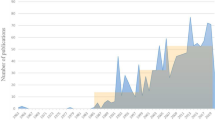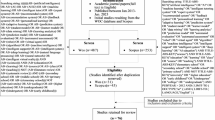Abstract
Educational artificial intelligence (EAI) refers to the use of artificial intelligence (AI) to support personalized and automated feedback and guidance in the educational field. Inevitably, it serves as a more important part of the educational system in the coming years. However, novel development in this field has been inadequately reviewed and conceptualized in a visualized, objective and comprehensive way. In this view, a bibliometric analysis was conducted to obtain an overview of its trends from publication outputs, countries’ cooperation, cluster analysis, and research evolution. Around 8660 Scopus-published articles from 2000 to 2019 were gathered for analysis using CiteSpace and Alluvial generator. In the study, a growing interest in EAI research and deepening cooperation among countries was first identified, entailing favorable conditions for promoting globalization in this aspect. Afterward, five core clusters were established for the intellectual structure of EAI, including intelligent tutoring system, learning system, student, labeled training data, and pedagogy. The development of EAI research was further conceptualized as follows: (a) technological foundation; (b) technological breakthrough; (c) intelligent application; and (d) symbiotic integration. Finally, three prospective directions for future EAI research were suggested.



Similar content being viewed by others
References
Aleven, V., Mclaren, B., Sewall, J., & Koedinger, R. (2009). A new paradigm for intelligent tutoring systems: example-tracing tutors. International Journal of AI in Education, 19(2), 105–154. https://doi.org/10.1007/s11825-010-0238-8.
Aleven, V., Mclaren, B. M., Sewall, J., Velsen, M. V., Popscu, O., Demi, S., et al. (2016). Example-tracing tutors: inteligent tutor development for non-programmers. International Journal of AI in Education, 26(1), 224–269. https://doi.org/10.1007/s40593-015-0088-2.
Anthony, G. (1996). Active learning in a constructivist framework. Educational Studies in Mathematics, 31(4), 349–369. https://doi.org/10.1007/BF00369153.
Baker, R. S. J. D., & Yacef, K. (2009). The State of Educational Data Mining in 2009: A Review and Future Visions. Journal of Educational Data Mining, 1(1), 3–17.
Barrow, L., Markman, L., & Rouse, E. (2009). Technology’ s edge: the educational benefits of computer-aided instruction wp. 2007–17. Social Science Electronic Publishing, 1(1), 52–74. https://doi.org/10.1257/pol.1.1.52.
Bean, C. (2011). Engaging Ideas: The Professor’ s Guide to Integrating Writing, Critical Thinking and Active Learning in the Classroom (2 ed.). John Wiley & Sons Press.
Boveja, R., & Angely, W. (2008). Why students engage in “gaming the system. Journal of Interactive Learning Research, 19(Suppl 1), 185–224. https://doi.org/10.1249/01.MSS.0000402463.77363.8b.
Boulay, B., Avramides, K., Luckin, R., Martínez, E., Méndez, R., & Carr, A. (2010). Towards systems that care: a conceptual framework based on motivation, metacognition and affect. International Journal of AI in Education, 20(3), 197–229. https://doi.org/10.3233/JAI-2010-0007.
Brodley, E., & Friedl, A. (2011). Identifying mislabeled training data. Journal of AI Research, 11(1), 131–167. https://doi.org/10.1613/jair.606.
Brophy, S., Portsmore, M., & Rogers, C. (2008). Advancing engineering education in p-12 classrooms. Journal of Engineering Education, 97(3), 369–387. https://doi.org/10.1002/j.2168-9830.2008.tb00985.x.
Chen, M. (2006). Citespace II: detecting and visualizing emerging trends and transient patterns in scientific literature. J. Am. Soc. Inf. Sci. Technol., 57(3), 359–377. https://doi.org/10.1002/asi.20317.
Chen, H., Hsieh, L., & Hsu, H. (2007a). Mining learner profile utilizing association rule for web-based learning diagnosis. Expert Systems with Applications, 33(1), 6–22. https://doi.org/10.1016/j.eswa.2006.04.025.
Chen, C., Zhu, W., Tomaszewski, B., & Mac Eachren, A. (2007b). Tracing conceptual and geospatial diffusion of knowledge. In D. Schuler (Ed.), International conference on online communities and social computing (pp. 265–274). Berlin: Springer, Heidelberg.
Chen, Y., & Wang, J. Z. (2004). Image categorization by learning and reasoning with regions. Journal of Machine Learning Research, 5, 913–939.
Conati, C., & Maclaren, H. (2009). Empirically building and evaluating a probabilistic model of user affect. User Modeling and User-Adapted Interaction, 19(3), 267–303. https://doi.org/10.1007/s11257-009-9062-8.
Dalpé, R. (2002). Bibliometric analysis of biotechnology. Scientometrics, 55(2), 189–213.
Diattara, N., Luengo, V., & Cordier, A. (2016). Towards an Authoring Tool to Acquire Knowledge for ITS Teaching Problem Solving Methods. European Conference on Technology Enhanced Learning (pp.575–578). https://doi.org/10.1007/978-3-319-45153-4_66.
Drigas, A. S., & Ioannidou, R. E. (2013). A review on artificial intelligence in special education. Communications in Computer and Information Science. https://doi.org/10.1007/978-3-642-35879-1_46.
Dutton, T. (2018). An Overview of National AI Strategies, Medium. [Online]. Available: https://medium.com/politics-ai/an-overview-ofnational-ai-strategies-2a70ec6edfd.
Felder, M., & Brent, R. (2005). Understanding student differences. Journal of Engineering Education, 94(1), 57–72. https://doi.org/10.1002/j.2168-9830.2005.tb00829.x.
Francisco, G., Mercedes, Ú., & Bartolomé, M. (2016). The intellectual structure of research in hospitality management: a literature review using bibliometric methods of the journal international journal of hospitality management. International Journal of Hospitality Management, 52, 121–130. https://doi.org/10.1016/j.ijhm.2015.10.007.
Freeman, S., Eddy, L., Mcdonough, M., Smith, M. K., Okoroafor, N., Jordt, H., et al. (2014). Active learning increases student performance in science, engineering, and mathematics. Proceedings of the National Academy of Sciences of the United States of America, 111(23), 8410–8415. https://doi.org/10.1073/pnas.1319030111.
Guilherme, A. (2017). AI and education: the importance of teacher and student relations. AI & Society, 34(1), 47–54. https://doi.org/10.1007/s00146-017-0693-8.
Hall, M., Frank, E., Holmes, G., Pfahringer, B., Reutemann, P., & Witten, I. H. (2009). The WEKA data mining software. ACM SIGKDD Explorations Newsletter, 11(1), 10. https://doi.org/10.1145/1656274.1656278.
Han, J., Zhao, W., Jiang, Q., Oubibi, M., & Hu, X. (2019). Intelligent Tutoring System Trends 2006–2018: A Literature Review. 2019 Eighth International Conference on Educational Innovation through Technology (EITT). https://doi.org/10.1109/eitt.2019.00037.
Herreid, F., & Schiller, A. (2013). Case study: case studies and the flipped classroom. Journal of College Science Teaching, 42(5), 62–67. https://doi.org/10.1177/0047239516658444.
Hinton, G. E., Osindero, S., & Teh, Y.-W. (2006). A fast learning algorithm for deep belief nets. Neural Computation, 18(7), 1527–1554. https://doi.org/10.1162/neco.2006.18.7.1527.
Huang, B., Zhu, Y., & Siew, K. (2006). Extreme learning machine: theory and applications. Neurocomputing, 70(1–3), 489–501. https://doi.org/10.1007/s00521-013-1522-8.
Jia, Y., Shelhamer, E., Donahue, J., Karayev, S., Long, J., Girshick, R., Guadarrama, S., & Darrell, T. (2014) Caffe: Convolutional architecture for fast feature embedding. In Proc. of the ACM International Conf. on Multimedia, pp. 1–4.
Johns, J., & Woolf, B. (2006). A dynamic mixture model to detect student motivation and proficiency. National Conference on AI. AAAI Press.
Kai, L., **angen, U., & Pei, W. (2018). Do machines need education? a review on the education of general artificial intelligence and educational innovation. Open Education Research, 24(1), 11–14. (in chinese).
Kamimura, R., & Yoshida, F. (2003). Teacher-directed learning: information-theoretic competitive learning in supervised multi-layered networks. Connection Science, 15(2–3), 117–140. https://doi.org/10.1080/09540090310001611136.
Kandlhofer, M., Steinbauer, G., Hirschmuglgaisch, S., & Huber, P. (2016)Artificial intelligence and computer science in education: From kindergarten to university. Frointiers in Education conference. https://doi.org/10.1109/FIE.2016.7757570.
Krizhevsky, A., Sutskever, I., & Hinton, G. (2012). Imagenet classification with deep convolutional neural networks. Advances in neural information processing systems, 25(2), 1–8. https://doi.org/10.1145/3065386.
Kurzweil, R. (1999). The age of spiritual machines: when computers exceed human intelligence. Penguin USA: New York Press.
Laurent P, Bertrand P, Virginie L, & Lauriane Dakkak-Arnoux PWC (2018) Plans for AI: Where Do We Stand?. European Commission website. Retrieved February 1, 2020. from https://ec.europa.eu/growth/toolsdatabases/dem/monitor/sites/default/files/DTM_AI%2520USA-China-EU%2520plans%2520for%2520AI%2520v5.
Lecun, Y., Bengio, Y., & Hinton, G. (2015). Deep learning. Nature, 521(7553), 436. https://doi.org/10.1142/S1793351X16500045.
Mason, S., Shuman, R., & Cook, E. (2013). Comparing the effectiveness of an inverted classroom to a traditional classroom in an upper-division engineering course. IEEE Transactions on Education, 56(4), 430–435. https://doi.org/10.1109/TE.2013.2249066.
Mccarthy, S., Likens, D., Johnson, M., Guerrero, A., & Mcnamara, D. S. (2018). Metacognitive overload!: positive and negative effects of metacognitive prompts in an intelligent tutoring system. International Journal of AI in Education, 4, 1–19. https://doi.org/10.1007/s40593-018-0164-5.
Miyazoe, T., & Anderson, T. (2010). Learning outcomes and students’ perceptions of online writing: simultaneous implementation of a forum, blog, and wiki in an efl blended learning setting. System, 38(2), 185–199. https://doi.org/10.1016/j.system.2010.03.006.
Mayer, R. E., et al. (2009). Clickers in college classrooms: fostering learning with questioning methods in large lecture classes. Contemporary Educational Psychology, 34(1), 51–57. https://doi.org/10.1016/j.cedpsych.2008.04.002.
Pane, J., Beth, A., Daniel, F., & Karam, R. (2013). Effectiveness of cognitive tutor algebra i at scale. Educational Evaluation and Policy Analysis, 36(2), 127–144. https://doi.org/10.3102/0162373713507480.
Pedregosa, F., et al. (2011). Scikit-learn: machine learning in python. Journal of Machine Learning Research, 12, 2825–2830.
Pablo, R., Cristina, P., & Desiderio, J. (2015). What drives eco-innovators? A critical review of the empirical literature based on econometric methods. Journal of Cleaner Production, 112, 2158–2170. https://doi.org/10.1016/j.jclepro.2015.09.009.
Richardson, M., & Domingos, P. (2006). Markov logic networks. Machine Learning, 62(1–2), 107–136. https://doi.org/10.1007/s10994-006-5833-1.
Ritter, S., Anderson, R., Koedinger, R., & Corbett, A. (2007). Cognitive tutor: applied research in mathematics education. Psychonomic Bulletin & Review, 14(2), 249–255. https://doi.org/10.3758/BF03194060.
Roll, I., & Wylie, R. (2016). Evolution and revolution in artificial intelligence in education. International Journal of Artificial Intelligence in Education, 26(2), 582–599. https://doi.org/10.1007/s40593-016-0110-3.
Roll, I., Aleven, V., Mclaren, M., & Koedinger, R. (2011). Improving students’ help-seeking skills using metacognitive feedback in an intelligent tutoring system. Learning & Instruction, 21(2), 280. https://doi.org/10.1007/s40593-016-0110-3.
Romero, C., & Ventura, S. (2007). Educational data mining: a survey from 1995 to 2005. Expert Systems with Applications, 33(1), 135–146. https://doi.org/10.10123/y405233-012-0100-12.
Rosvall, M., & Bergstrom, C. T. (2010). Map** change in large networks. PLoS ONE, 5(1), e8694. https://doi.org/10.1371/journal.pone.0008694.
Sales, A. (Ed.). (2019). Corporate Social responsibility and corporate change. Ethical Economy.https://doi.org/10.1007/978-3-030-15407-3.
Shiffrin, R. M., & Borner, K. (2004). Map** knowledge domains. Proceedings of the National Academy of Sciences, 101(Supplement 1), 5183–5185. https://doi.org/10.1073/pnas.0307852100.
Sonnenwald, D. H. (2007). Scientific collaboration. Annual Review of Information Science and Technology, 41(1), 643–681.
Strayer, F. (2012). How learning in an inverted classroom influences cooperation, innovation and task orientation. Learning Environments Research, 15(2), 171–193. https://doi.org/10.1007/s10984-012-9108-4.
Vanlehn, K. (2011). The relative effectiveness of human tutoring, intelligent tutoring systems, and other tutoring systems. Educational Psychologist, 46(4), 197–221. https://doi.org/10.1080/00461520.2011.611369.
Varner, L. K., Roscoe, R. D., & McNamara, D. S. (2013). Evaluative misalignment of 10th-grade student and teacher criteria for essay quality: an automated textual analysis. Journal of Writing Research, 5(1), 35–59. https://doi.org/10.17239/jowr-2013.05.01.2.
Walker, E., Rummel, N., & Koedinger, K. (2014). Adaptive intelligent support to improve peer tutoring in algebra. International Journal of AI in Education, 24(1), 33–61. https://doi.org/10.1007/s40593-013-0001-9.
Wang, X., & Hammer, P. (2017). Motivation and emotion in NARS. Journal of Artificial General Intelligence, 8(1), 1–30. https://doi.org/10.1515/jagi-2017-0001.
Wu, X., Kumar, V., Quinlan, R., Ghosh, J., Yang, Q., Motoda, H., et al. (2008). Top 10 algorithms in data mining. Knowledge and Information Systems, 14(1), 1–37. https://doi.org/10.1007/s10115-007-0114-2.
Zhu, W., & Wang, Z. (2018). The collaborative networks and thematic trends of research on purchasing and supply management for environmental sustainability: a bibliometric review. Sustainability, 10(5), 1510. https://doi.org/10.3390/su10051510..
Funding
This study did not receive any specific grant from funding agencies in the public, commercial, or not-for-profit sectors.
Author information
Authors and Affiliations
Contributions
SP and WX designed this study together. SP collected data from Scopus, and then two authors worked together to select/delete data to conduct analysis and discussion. SP completed the first draft and WX made revisions. Both authors had read and approved the final manuscript.
Corresponding author
Ethics declarations
Conflict of interest
The authors declare that they have no competing interest.
Additional information
Publisher's Note
Springer Nature remains neutral with regard to jurisdictional claims in published maps and institutional affiliations.
Rights and permissions
About this article
Cite this article
Song, P., Wang, X. A bibliometric analysis of worldwide educational artificial intelligence research development in recent twenty years. Asia Pacific Educ. Rev. 21, 473–486 (2020). https://doi.org/10.1007/s12564-020-09640-2
Received:
Revised:
Accepted:
Published:
Issue Date:
DOI: https://doi.org/10.1007/s12564-020-09640-2




